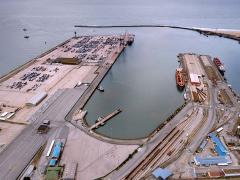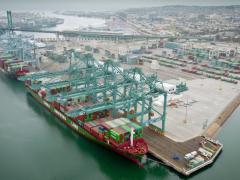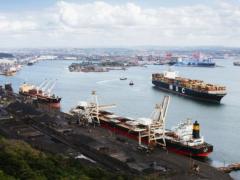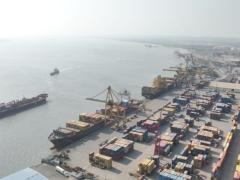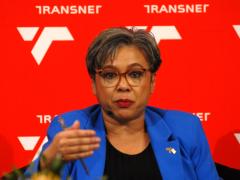A whopping 77% of Cape
Town companies have said
that the viability of their
businesses is under threat
due to significantly reduced
staff productivity and late
freight deliveries as a result of
“dangerous and unreliable”
commuter services on the
Metrorail.
“Workers – including
manufacturing, transport
and supply chain staff – are
harassed or threatened by
other passengers on the trains
and often show
up at work
late or fail to
show up at
all because
the trains run
late due to
broken down
infrastructure,”
said Janine
Myburgh,
president of the
Cape Chamber
of Commerce
and Industry,
announcing
the results
of a survey conducted by the
chamber on Metrorail’s effect
on business in the city.
These concerns
prompted the Western Cape
government’s legal team to
explore proposed legislation
that would see management of
all rail services fall under the
jurisdiction of the provincial
government, instead of
national government.
This would then
allow the Western Cape
government to hold the rail
authorities accountable for
the mismanagement of the
province’s train infrastructure,
said Western Cape premier,
Helen Zille.
“When one reads about a
purchase of rolling stock that is
too tall for our rail system, and
the Guptas creaming R5 billion
(or 20%) off the purchase price
of new locomotives, it fuels
my determination to pass
provincial legislation that will
hold the national government
accountable for such gross
dereliction of duty. We are
determined to ensure that such
legislation is passed within this
term of office,” Zille said in a
statement.
She
highlighted
that there
had been a
400% increase
in train
cancellations
in the Western
Cape over the
past two years,
according
to a recent
presentation to
the provincial
standing
committee for
transport.
“Seemingly simple
and routine repairs also
take months – such as the
replacement of a signal box on
the Southern line – which has
dragged on for 32 weeks. This
has caused extreme disruption
to the services,” Zille added,
noting that as a result many
were turning to road-based
transport, adding to the
massive congestion problem
that has developed in Cape
Town, and which constitutes a
further brake on growth.
“The national government
continues banging on about
how South Africa’s number
one priority is economic
growth and job creation. This
disjuncture between what
is said and done occurs in
almost every policy sphere,”
she commented.
In response to Zille’s call,
Minister of Transport Joe
Maswanganyi pointed out
that in terms of the ‘Legal
Succession to the South
African Transport Act’, the
Department of Transport
was the only legitimate
transport authority to ensure
rail services were provided.
“Consequently, the
intention by premier
Helen Zille is dishonest,
opportunistic and absolute
political manoeuvring that
seeks to undermine the
enormous efforts by the
ANC government to change
the rail landscape of South
Africa,” he said.
Maswanganyi admitted
that it was “critical to provide
a predictable and reliable”
rail service, noting that he
would continue to engage
with the Western Cape MEC
for Transport to “collectively
find cordial solutions”.
He said the DoT was
making progress on the
development of the National
Rail Policy which would
guide rail development in
the country. According
to Maswanganyi, more
than 50% of South Africa’s
rolling stock and rail
network is more than 50
years old. “This impacts
negatively on service
delivery, especially on the
movement of freight and
commuters.”
INSERT & CAPTION
About 20% of
businesses say they
have even considered
relocating to reduce
commuting problems
for their workers.
– Janine Myburgh
Comments | 0

